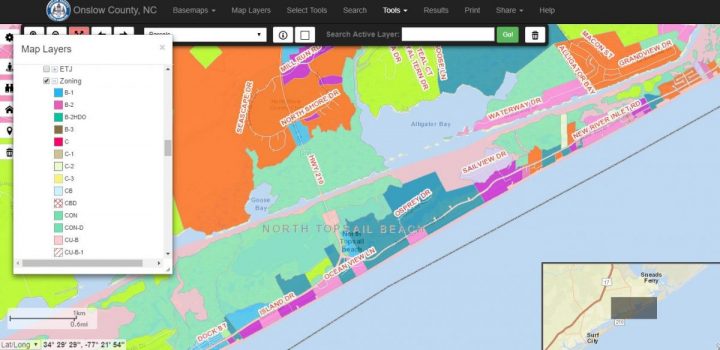
NORTH TOPSAIL BEACH – The town board here is taking more time to fine-tune land use regulations after residents raised concerns about proposed changes, one of which includes striking a rule that prohibits the rezoning of conservation-designated lands.
Under the town’s current Coastal Area Management Act, or CAMA, land use plan, land within the conservation district cannot be rezoned.
Supporter Spotlight
That rule was added to the land use plan in 2009, prohibiting rezoning of a little more than 2,300 acres.
The regulation states the town “will not support” commercial or residential development in conservation areas. Only water-dependent uses may be permitted within the district.
Municipalities routinely update land use plans, a guide governments use to make development decisions.
After months of meetings and joint workshops with the town’s board of aldermen, North Topsail Beach’s planning board submitted for adoption an updated plan that omits wording banning lands in conservation districts from being rezoned.
The conservation district was created to protect the flood plain, coastal waters and areas of environmental concern.
Supporter Spotlight
North Topsail Beach resident and former mayor Dan Tuman urged the board of aldermen during a public hearing Wednesday to keep the rule in place.

“I would really, really, really caution and recommend that you do not make this change at all,” he said.
In a letter he submitted to the town prior to the hearing, Tuman explained that the town has protected land within the conservation district since it was incorporated in 1990.
“The language in our present LUP is very proactive,” he wrote. “In effect it says that these lands are important, they will be preserved and will not be rezoned.”
Alderwoman Joann McDermon said she wanted the board to postpone a decision, giving its members more time to discuss the proposed changes and answer questions that have been raised by residents.
“I just am feeling like we need some additional details,” she said.
Planning Director Deborah Hill said she would like to include some changes to the proposed land use plan as well.
The board voted to table a decision. Once aldermen adopt a land use plan they have to submit it to the state Coastal Resources Commission for approval.

Carin Faulkner, North Topsail Beach’s assistant town manager and town clerk, said the proposed change does not mean open season for development of land in the conservation district.
“This doesn’t necessarily mean the town is willing to re-designate all CON-D (conservation district) property,” she said. “It’s not like changing our LUP as written as a green light to change all CON-D property.”
Rezoning requests have to be submitted to the town and reviewed by the planning board. The planning board then makes a recommendation to the board of aldermen to either grant or deny a rezoning request. The board of aldermen must hold a public hearing prior to a vote.
Town officials recall a rezoning appeal in 2007, two years before the current land use plan was adopted, to change property zoned conservation to residential. The request was denied.
In 2013, the board granted a request to rezone about 2 acres from conservation district to residential. The land had been developed before the town incorporated in 1990 so the board approved the rezoning to bring the property into compliance.
“It’s not an easy process to rezone,” Faulkner said. “Re-zonings are pretty much a big deal. They don’t happen very often.”
Still, Tuman argues, allowing the possibility to rezone conservation district areas would be a risky move by the town.
That’s because showing a commitment to protecting conservation areas is particularly important in the town’s efforts to convince the federal government to re-map the Coastal Barrier Resources Act, or CBRA, designation that encompasses 65 percent of the town, he said.
“Maintaining our Conservation District is vital in our efforts to have the town removed from the CBRA system,” Tuman wrote.
For years the town has pressing the U.S. Fish and Wildlife Service, the regulatory agency that mapped out and established CBRA zones in the early 1980s, to remove populated areas of town from the zone.
Building is allowed in CBRA (pronounced “cobra”) zones, but, in an effort to discourage development within these areas, the government restricts federal subsidies, including flood insurance and Federal Emergency Management Agency aid.
Town officials argue that USFWS designated thousands of acres within the town years after the causeway linking North Topsail Beach to the mainland was built in the 1960s. The town has documents that show Onslow County had begun providing infrastructure – roads, water, sewer and power – to the north end before CBRA was enacted.
For this reason, they argue, the town was incorrectly designated CBRA.
The town has turned to Washington for help, garnering the support of U.S. Rep. Walter B. Jones, R-N.C., and former U.S. Sen. Kay Hagan who, in 2012, introduced the first in what would be one in a series of bills to shift CBRA boundaries within the town.
Those bills did not move forward because the fish and wildlife service did not support the revisions.
Town Manager Stuart Turille told the board last week that he anticipates a bill similar those previously put before Congress to be introduced this month.







